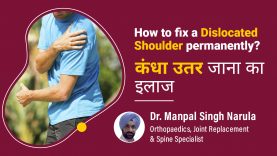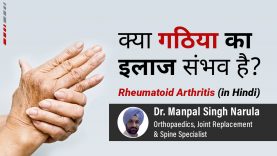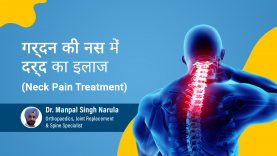Rheumatoid Arthritis Treatment & Symptoms | गठिया का उपचार कैसे करें? How to cure rheumatoid arthritis permanently?
- 5.50K
- 1 month ago
Dr. Manpal Singh Narula
Dr. Manpal Singh Narula
Rheumatoid Arthritis Treatment & Symptoms | रूमेटोइड गठिया को स्थायी रूप से कैसे ठीक करें? क्या रुमेटीइड गठिया वंशानुगत है?
In this video, Our SimpliHealth expert and Senior Consultant Orthopedic Spine and Joint Specialist, Dr. MS Narula, is talking about a very common problem, Rheumatoid Arthritis(Rheumatoid Arthritis Treatment & Symptoms) or gathiya.
You must have commonly seen this disease among your relatives or friends. Since it is a chronic debilitating condition, patients usually get frustrated. As it requires lifelong treatment, the doctor would like to give some information about Rheumatoid arthritis using this platform.
WHAT IS RHEUMATOID ARTHRITIS OR GATHIYA?
It is a chronic inflammation of joints. It is different from osteoarthritis. Osteoarthritis commences with age; there is wear and tear on joints. The patient may have bowel, urine, or viral infection, resulting in arthritis in other conditions or some skin condition.
There are some criteria for Rheumatoid arthritis. It is chronic; by chronic, the doctor means long standing; in some cases, it lasts life long. There is a chronic inflammation of the joint lining, due to which there are some symptoms that we consider a condition of Rheumatoid arthritis.
There are some criteria for this
- It affects multiple joints, mostly small joints like fingers, wrist, elbow, feet, and ankle. So this condition involves small and multiple joints.
- It can affect both bilateral or symmetrical; it’s not like if you have arthritis, on the one hand, it will not affect the other; it will simultaneously affect both sides.
- There are specific blood markers like RA factor and anti-CCP. These are present in high amounts in Rheumatoid arthritis patients, and
- It may lead to deformities in later stages, majorly in the hands and legs.
- Other clinical symptoms like light or low-grade fever, malaise, weakness, and fatigue are very common and early symptoms of this condition. The patient feels malaise, uncomfortable feeling, weak, and fatigued.
- Early morning stiffness is another very important criterion in Rheumatoid arthritis. Patients complain about stiffness in joints in the early morning. So, there is pain and stiffness, especially in the early morning. If any patients present the above symptoms, we encamp them in Rheumatoid arthritis.
HOW CAN WE MAKE A DIAGNOSIS OF RHEUMATOID ARTHRITIS?
There are specific criteria for this condition’s clinical symptoms. Usually, we see signs in patients aged 30-60 years. However, there is a variety of Rheumatoid arthritis where it can commence early or late. But most patients are between the age of 30 to 50 years. Females are more prone to Rheumatoid arthritis, and they show symptoms of bilateral or symmetrical joints on both sides.
Some clinical signs are early morning stiffness in the legs and hands, pain, swelling, inflammation, fatigue, and malaise. In addition, there are some clinical signs like nodule formation on the skin, and if we suspect it is Rheumatoid arthritis, and the symptoms have persisted for the last six weeks; then, we perform a blood markers examination.
Under lab investigation, we screen the RA factor test, but please remember this comes positive in only 80% of cases, and we perform another test which is anti-CCP. So it is very important to understand one thing about these tests.
Often patients come to us and say that their RA factor is negative. See RA factor is not positive in all the cases. There are 20-30% of cases that show negative RA test in blood but are a patient of Rheumatoid arthritis, which we call a seronegative variety of an Rheumatoid arthritis. So next, we do further investigation to confirm our doubt by doing X-Ray of hands and feet. Erosion of joints seen in X-Ray helps in diagnosis.
So it is the combination of clinical symptoms, lab tests, and Radiological Features.
WHAT IS RHEUMATOID ARTHRITIS? HOW DOES IT OCCUR? | Rheumatoid Arthritis Treatment & Symptoms
It is a genetic problem. Instead, it is a combination of genetic, hormonal, and environmental issues. We have specific markers or genes present in the blood which causes the autoimmune disorder. Our body has its immunity which fights against germs and infections.
In the case of Rheumatoid arthritis, the body generates immunity against its cells. Since it acts on its own cells, we call this condition an autoimmune disorder. In Rheumatoid arthritis, the body develops an excessive immune response against its cells. This immune response attacks the synovial lining of joints and causes inflammation. This response results in pain, stiffness, swelling in joints, nodule formation, and gradually, there is destruction in joints, and ultimately, a deformity stage commences in the hands and legs.
One very common myth is associated with Rheumatoid arthritis. People assume that Rheumatoid arthritis only involves bones. Please remember that Rheumatoid arthritis is a disease of bones, muscles, connective tissue, and nerves, so much so that it affects the heart and lungs. Rheumatoid arthritis is like diabetes; it is a chronic condition that affects many organs. However, it is marked more commonly in joints and bones.
WHAT IS THE PROGNOSIS OF RHEUMATOID ARTHRITIS?
Rheumatoid arthritis is a chronic inflammation condition. Our purpose is to explain to the patient that we can control this condition, but we can’t cure it. It is just like diabetes; if their sugar is under control, the patient can lead an everyday life; the same goes with Rheumatoid arthritis.
We can control Rheumatoid arthritis but can’t cure it. Because it is associated with genetic factors. Some risk factors are related to Rheumatoid arthritis like smoking, obesity, patients with a family history of Rheumatoid arthritis, and those who have long-standing problems. So these are a few risk factors, but primarily the prescribed medicines run lifelong.
This disease does not remain the same, you will not have the same condition for a whole year. Like in the Raining season or winters, or changes in weather, the attack of pain and stiffness in joints comes suddenly. So we call this condition a relapse or flare-up. It can stay low grade for a few weeks or months, or a year, called remission.
So the treatment of Rheumatoid arthritis runs between this flare-up and remission. This is why we callthis condition a long-standing chronic problem. Also, you that since it is a long-standing condition, people often get frustrated and search for other remedies, which most common is the consumption of desi dawai, which is nothing more than a high-dose steroid. So one should always be cautious. And definitely, one can try other treatments, but you must consult your physician first.
TREATMENT OF RHEUMATOID ARTHRITIS
We treat Rheumatoid arthritis in various categories: physical, rehabilitation, and occupational therapy.
It commences with stiffness and deformities in joints. So physical therapy remains the mainstay of the treatment. Then comes the medical treatment. We have perfect drugs for Rheumatoid arthritis, but our purpose is not to relieve the pain. However, we wish to make the patient mobile and physically active and prevent the permanent deformities as much as possible or stop their progression.
So the first line of treatment is pain killers or nonsteroidal anti-inflammatory drugs. We prescribe them during the initial stage of Rheumatoid arthritis, but we abstain from long-term use as regular painkillers consumption imposes side effects on the kidney and liver. So painkillers are the initial and first line of treatment in which we prescribe steroids. We prescribe steroids in low doses, and pulse-like meaning given in breaks are effective in this condition but avoid the consumption of a high amount of steroids.
Although people take high-dose steroids in desi dawai, it may show its effect like magic, but it would lead to hollowness in bones, and you may suffer from multiple issues. So Steroid, when consumed only in proper doses, is effective for Rheumatoid arthritis.
Medications
Next are disease-modifying drugs, or DMARDs are the primary medicine used for the sole purpose of preventing deformities in the legs and hands. Different medications, like methotrexate, vasospasm, and Hqtor, were used very commonly in COVID times. So these medicines are quite safe and effective, and we must use them in combination; with at least two drugs so that their side effects are minimal.
Another thing we must understand today is that the doctor prescribes you the combination drug for Rheumatoid arthritis. However, it may stop showing its effect after a few months, so we need to be cautious and shift to the next level. So we must give drug holidays. We must give a break so that the body can recover from the side effects. And when we use the drugs in combination, these DMARDs are very effective.
Then we have Biologics. These DMARDs and biologics bring change in the body’s immune response; they act like immunosuppressants so that we can control autoimmune disorders. Biologics are an expensive and stronger class of drugs. We use them widely. Then, of course, we have surgical management.
Since rheumatoid affects mainly the main joint like the knee or hips, we surgically replace these joints with hip joint replacement or knee replacement. So there are specific indications of surgeries in the late stages of this, but by enlarging the combination of physical, occupational, and nutritional therapy, there are certain foods that we can aggravate so we tell the patient to avoid them.
Surgical Treatment
Apart from that, we have surgical and medical treatment whenever required.
The doctor wants to explain to you about surgeries we perform for Rheumatoid arthritis. Suppose there are deformities in small joints like fingers. In that case, we should prevent them as their surgical correction is not very satisfactory.
Surgical management comes when there is the involvement of big joints like the knee or hips. However, osteoarthritis also affects the knee. In this condition, knee damage relatively occurs at an early stage, so we need to do knee replacement at an early age group, somewhere between 40 and 50.
If there is a complete deterioration of the joint and medicines are not giving relief, making you immobile, you should opt for knee replacement surgery. As knee replacement surgery is very successful, it modifies the quality of life. It is bloodless, painless surgery, and wherever your doctor examines that there is a complete deterioration of the knee with, please opt for knee replacement surgery.
But yes, you must continue with your anti-rheumatoid drugs. This does not only affect bones; it affects muscles, nerves, pins, needles, and tissue, so the drug would help in combating the damage, and wherever needed, opt for surgical options.
Bottom Line
So, in the end, I will advise my patients that they don’t get disheartened or frustrated because of Rheumatoid arthritis; you need to take long-term medicine for which you must consult your physician. Because when you are in a flare-up, there is an increase in the dose of medication.
Otherwise, we maintain this with one or two drugs. Be cautious while consuming desi dawai as it has a high amount of steroids. Patients must continue their physical rehabilitation therapy, and a nutritional diet. Avoid smoking. Patients must take care of regular medicine and monitor their side effects simultaneously.
Thank You. Take care and stay safe.















Comments (0)